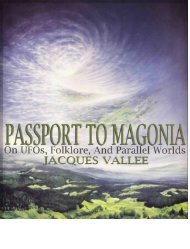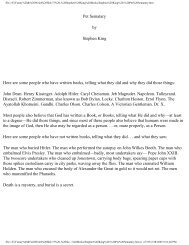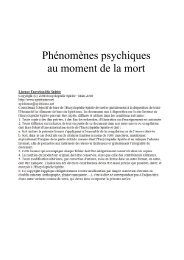extraordinary%20encounters
extraordinary%20encounters
extraordinary%20encounters
You also want an ePaper? Increase the reach of your titles
YUMPU automatically turns print PDFs into web optimized ePapers that Google loves.
192 OINTS<br />
In time Wo o d rew learned, via re c ove re d<br />
“memories,” that she had been interacting with<br />
the Ogattans since her childhood. Her fir s t<br />
contact took place in the early 1930s when she<br />
was three and a half years old. For the next six<br />
years, she had many experiences with space<br />
people. She was flown to a beautiful planet<br />
w h e re she could “hear colors” and “see music”<br />
because, like her fellow Ogattans, she was fre e<br />
of the limitations of human physiology; thus,<br />
her brain processed stimuli differe n t l y.<br />
Though her contacts we re ove rw h e l m i n g l y<br />
with Ogattans, on occasion she met beings<br />
f rom other worlds. Once she had an out-ofbody<br />
encounter with beings who looked halfhuman<br />
and half-fish. These entities seemed<br />
f r i e n d l y, but, on a handful of other occasions,<br />
she dealt with extraterrestrials who we re not so<br />
amiable. Some believed the Earth to be of no<br />
s i g n i ficance, thus its problems we re of no concern<br />
to major players in the larger cosmic ord e r.<br />
Woodrew became a lecturer on the New<br />
Age circuit, wrote a self-published book, and<br />
published a newsletter, The Woodrew Update.<br />
After the Ogattans warned them that they<br />
would have to move to preserve their safety<br />
during the coming geological upheavals,<br />
Woodrew and her husband, Dick Smolowe,<br />
bought a property in western North Carolina<br />
in 1982. They moved from Westport, Connecticut,<br />
to the survivalist compound they<br />
named Reisha Way. In 1988, Doubleday released<br />
Woodrew’s book Memories of Tomorrow.<br />
A few years later, Woodrow and Smolowe<br />
moved to Winston-Salem for health reasons.<br />
See Also: Channeling; Dual reference<br />
Further Reading<br />
Heard, Alex, 1999. Apocalypse Pretty Soon: Travels in<br />
End-Time America. New York: W. W. Norton and<br />
Company.<br />
Woodrew, Greta, 1981. On a Slide of Light. Black<br />
Mountain, NC: New Age Press.<br />
———, 1988. Memories of Tomorrow. New York:<br />
Dolphin/Doubleday.<br />
OINTS<br />
“OINTS” are “Other Intelligences” in an<br />
acronym coined by maverick biologist and<br />
anomalist Ivan T. Sanderson. To Sanderson<br />
OINTS are any beings that are on Earth but<br />
are not human. He did not confine his definition<br />
simply to extraterrestrial visitors, who in<br />
his view are only one among a variety of beings<br />
present on this planet. Poltergeists—invisible,<br />
destructive spirits—are one kind of<br />
OINT. So are the entities who, so he theorized<br />
in Invisible Residents (1970), dwell under<br />
the oceans, occasionally snatching ships,<br />
planes, and their crews in places such as the<br />
Bermuda Triangle. (“Could there have<br />
evolved a technological civilization . . . underwater?<br />
I am afraid I have to say that . . . there<br />
is no logical reason for stating that there could<br />
not be.”) He also believed that invisible dimensions<br />
or parallel universes surround humans.<br />
From these other dimensions, entities<br />
pop in and out of human reality with regularity,<br />
manifesting as everything from fairies to<br />
UFOs. They shift their shapes to whatever<br />
form may be appropriate to the occasion and<br />
the circumstance.<br />
Curiously, however, Sanderson held a dim<br />
view of all such visitors, not because he feared<br />
they might be unfriendly but because “the<br />
OINTS are . . . incredibly and abysmally stu -<br />
pid.” He suspected that they were so advanced<br />
that their technology now controlled them<br />
and that they have given up mental activity,<br />
just as technology has caused humans to reduce<br />
much of their physical activity. “That<br />
they are for the most part overcivilized and<br />
quite mad,” he wrote, “is, in my opinion, an<br />
open-ended question but quite probable. Perhaps,<br />
we will never be able to cope with them<br />
until we, too, all go quite mad.”<br />
See Also: Bermuda Triangle; Fairies encountered<br />
Further Reading<br />
Sanderson, Ivan T., 1970. Invisible Residents: A Dis -<br />
quisition upon Certain Matters Maritime, and the<br />
Possibility of Intelligent Life under the Waters of the<br />
Earth. New York: World Publishing Company.<br />
Old Hag<br />
The “Old Hag” is a folk expression—popular,<br />
for example, in Newfoundland—for the par-





